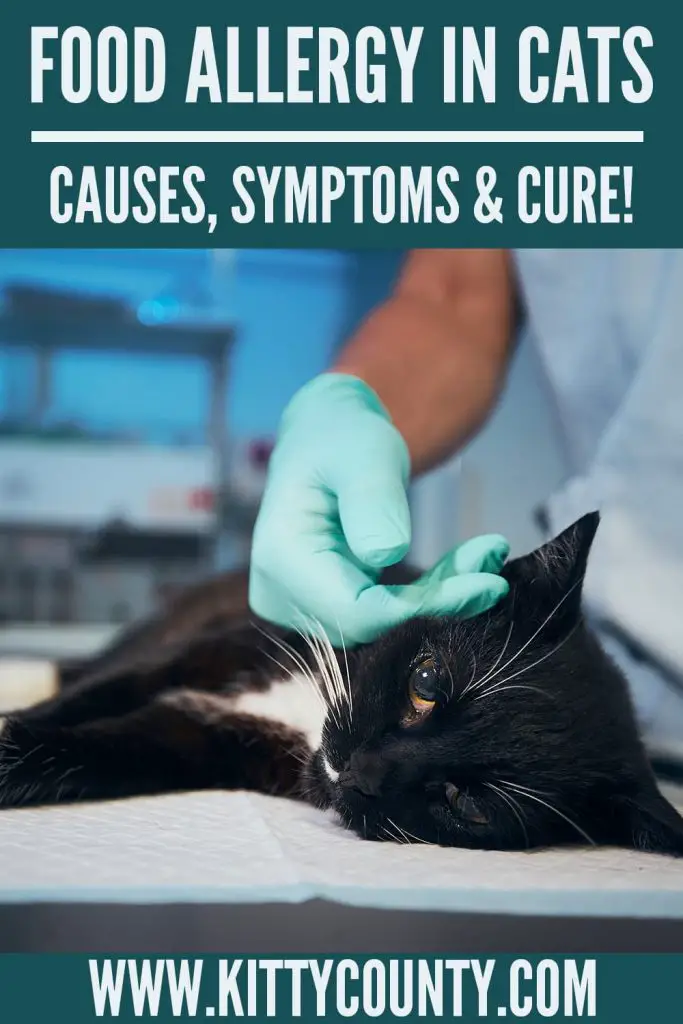When it comes to cat care, cat health is an important factor that needs to be attended to from all sides. And what I have observed is that cat owners often ignore food allergies in cats.
I have seen cat owners often ask the question can cats have food allergies?
Guys, food allergies in cats is a very real thing and that is why it deserves your attention and awareness.
Cats are our children that need the essential tending to in terms of what is providing the appropriate nutrition to them and what isn’t.
Food allergies in cats, as a matter of fact, are the third in line to allergies that cats get subjected to only besides environmental allergies and inhaled allergies.
Difference Between Food Allergies In Cats Versus Food Sensitivity In Cats.
I say this so often on this blog that if you want to care properly for your cat or cats, having sufficient knowledge base is the key.
Many times I have seen cat owners and lovers assume a lot of things about cat care without giving due attention to what they know or don’t know.
And that can sometimes can create a lot of health-related problems for your cats.
Talking about cat health and necessary knowledge base, I created these quick cat diet tips that you must check out.
I also created video content for the same so that the knowledge base is easy to consume.
Fun videos aren’t they?
Hey!, don’t forget to subscribe to our YouTube Channel so that we can shower you with cat love 3 times a week.
And while you are at a subscription streak, subscribe to the KittyCounty blog and I will send over A FREE Cat Behavior Training Guide right to your inbox.
Now back to the difference between food allergies in cats and food sensitivity in cats.
Understand this.
Just as is the case with dogs, cats can have food allergies and they can also develop sensitivity towards certain foods.
Food allergies, in general, lead to a whole-body response to a specific or a group of ingredients in the cat diet.
The response to food sensitivity, on the other hand, is localized to a specific organ mostly in the cat’s digestive tract.
This happens as a result of the cat’s inability to properly process certain food ingredients.
Food Sensitivity Symptoms
So as I mentioned food sensitivity is a localized reaction generated as a result of the cat’s inability to adequately digest specific ingredients of cat food.
The reaction mostly involves a cat’s GI tract.
What is important here to note is that the cat’s body as a whole isn’t allergic to the ingredient.
However, their GI tract is unable to process specific ingredients the way it processes other ingredients which leads to pain, discomfort and other GI symptoms.
Other food sensitivity symptom includes:
- Vomiting immediately after consuming food.
- Diarrhea
- Loss of Appetite and a sudden dislike towards the food.
- Gas and abdominal pain
- Reduced body agility and vitality.
Food Allergies In Cats Symptoms
Food allergy in cats is a totally different thing altogether.
When we are talking about food allergies in cats, as I said earlier your cat’s total bodily system reacts to it.
Rather than just digestive GI tract reaction as is the case with food sensitivity.
A food allergy usually expresses itself as a cascade of reaction mostly associated with the skin.
Food allergies in cats is a systematic reaction to a food ingredient that results in the release of histamine in addition to other allergic bodily responses.
The allergic reactions to food include:
- Increased Body Itching
- Unease and excessive scratching
- Skin redness
- Hair loss and inflamed skin
- Chronic ear problems.
- Skin lesions around head and neck
What To Do If You Know Your Cat Has Food Allergy
Now that you know what is the precise difference between food allergy in cats and selective food sensitivity in cats.
What to do if you have a cat that is having an allergic reaction like the ones we discussed.
First off, I want you to understand that although the symptoms that we discussed above do happen as a result of food allergies in cats.
It is also quite possible that the symptoms may be an indication of some other problem in your cat (mites, mange or fleas).
Plus, food sensitivity and allergic reactions in cats due to food is a very subjective problem.
Two cats may not have the same reaction to the same food.
On a similar basis, cats from two different breeds may exude different digestive responses to the same food.
Therefore, the best way would be to have your cat examined thoroughly by a visit to the vet.
So visit your vet if your cat has been frequently showing signs of allergic reactions.
What Kind Of Food Is Good For Cats With Allergies
Now once you have confirmed and established that the symptoms your cat is expressing are indeed due to a food allergy
Here are my top 5 researched and recommended hypoallergenic cat foods that you can buy right now.
1.Best Overall Hypoallergenic Cat Food
[maxbutton id=”1″ url=”https://amzn.to/2VbRceI”]
Perfect hypoallergenic cat food for cats with protein and car source.
2. Best Dry Cat Food For Allergies
[maxbutton id=”1″ url=”https://amzn.to/39TYW97″]
Choose this if your cat is vomiting a lot and coughing up hairballs.
Also known to make your cat’s coat shine.
3. Best Wet Cat Food For Allergies
[maxbutton id=”1″ url=”https://amzn.to/2VknxQm”]
The best thing about this grain-free blue basics cat food is that this food uses duck, which is healthy meat very rarely used in cat foods.
4. Best Natural Cat Food
[maxbutton id=”1″ url=”https://amzn.to/2PhnBNc”]
A balanced and healthy cat food based on whole foods.
5. Best Hypoallergenic Cat Treat
[maxbutton id=”1″ url=”https://amzn.to/2I0to5B”]
Special treats created to provide to help ease sensitive stomachs.
How Long For Cat Food Allergies To Go Away?
This is another important question that cat owners have if they know their fur babies are suffering from food allergies.
And I get it, you want your fur baby to come back to her joyful, playful self as fast as she can.
If you have confirmed from your vet that your cat has a true food allergy and the symptoms are not an indication of some other problem.
Then any sensitive stomach issues most probably must clear themselves off in 2 to 4 weeks.
Skin problems and itchiness will take a bit longer to neutralize.
Your vet may set a 12-week meal trial in certain extreme cases because that is the precise time period it takes for a cat to grow a new layer of skin tissues.
With that bit of useful info, we arrive at the end of this post.
I dearly hope you enjoyed reading the post as much as I enjoyed writing it.
And I also hope it helped expand your knowledge base on food allergies in cats, their symptoms and treatment.
Comment below if you have any queries or doubts.
Take great care of yourselves and your cat.
I will see you around.
Tada!!.










